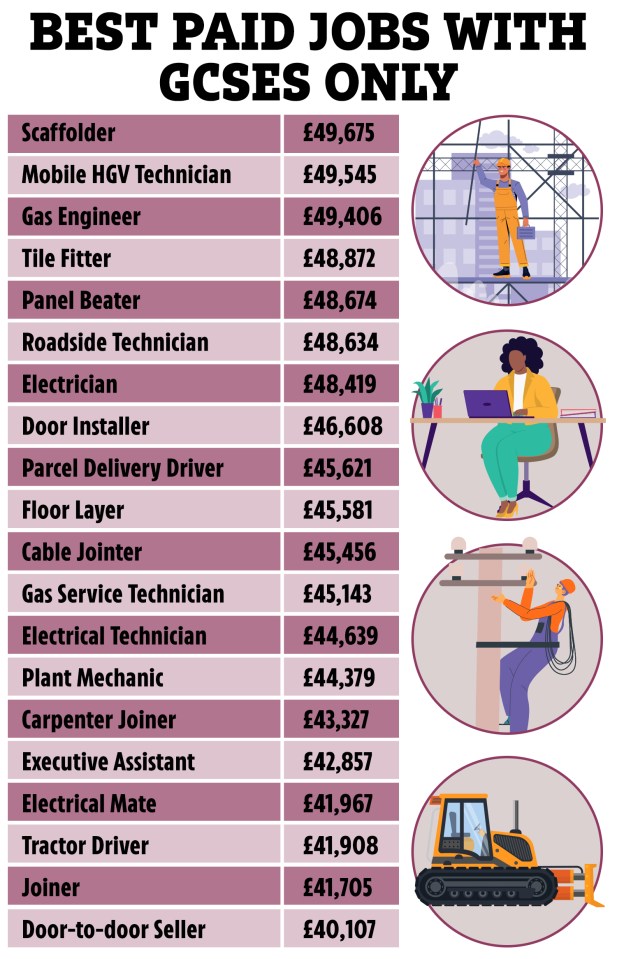IF you’ve just received your GCSE results and ready to hit the world of work, there are plenty of jobs where you can earn a pretty buck.
You can bank a top salary in lucrative roles that don’t require any further education and pay well above the national average to workers.
After years of study, many young people are ready to start earning.
And some of the highest paid jobs you can get with GCSEs alone can pay six figures a year.
Top of the list is scaffolders earning an average wage of £49,675, according to job site Adzuna.
But you could earn much more.
For example, one scaffolding couple has revealed how the job has netted them a whopping £500,000 in less than a year.
You can start training as a scaffolder after leaving school. Many firms offer apprenticeships so that you can earn as you learn.
Another top job is working as a mobile HGV technician earning a typical £49,545, which is a mechanic who repairs lorries and other big vehicles.
Again, you can get a foot into the career as an apprentice.
Or you could consider becoming an electrician. The average wage stands at £48,419, yet we have spoken to workers in this career raking in £16,000 a month.
For many top earning roles you’ll still need specialist training after finishing GCSEs.
Andrew Hunter, co-founder of job matching platform Adzuna, comments, “Many employers today are becoming increasingly relaxed on degrees and are much more keen on skills, passion, and drive, which is why it is entirely possible to carve out a lucrative career with just GCSEs.
“The key is getting your foot in the door, whether through an apprenticeship, internship, or T-levels.
“Many big firms, such as PwC, EY, and Rolls-Royce, run school leaver programmes every year where young jobseekers get to contribute to real projects and make a business impact.
“Once you’re in, you can develop your skills, gain experience, and even climb the corporate ladder.
“For those looking to start full-time immediately, there are plenty of jobs in the UK where a salary of up to £40k is achievable with the right focus and training.
“Signing up with a recruitment agency can also open up opportunities that aren’t always in plain sight.”
Apprenticeships are a great way to learn on the job especially for manual types of jobs such as electricians and plumbers.
But not all require extra skills.
For example, you could become a parcel delivery driver and receive an average £45,621 a year. You’ll just need a driving licence.
Or if you fancy a more office-based jobs working as an executive assistant would see you earn an average £42,857, according to Adzuna.
There isn’t any need for extra training but you could have to demonstrate that you are well organised and have good attention to detail to get your foot in the door.
In many office-based roles there can be lots of room for progression too.
You could also ask about sabbaticals where you spend some time in other teams across the office to learn about different types of roles.
When considering which jobs to apply for, it’s a good idea to look at average wages in the sector to understand how could you earn.
It can also help at the point of salary negotiations when you are offered a job.
Other top earning jobs with GCSEs include door-to-door selling as well as being a tractor driver.
If you’ve just received your GCSE results, we’ve also looked at the everyday jobs most at risk from AI and jobs where you can earn £104k a day with no qualifications.
And if you’re writing out a CV for the first time, an expert has revealed some of the mistakes to avoid.
How to ask for a pay rise
Asking for a pay rise can be daunting. Andrew Hunter, co-founder of job matching platform Adzuna shares his tips..
The end or the beginning of the financial years or quarters can mark an ideal time to schedule a quarterly performance review with your line manager.
This is when firms are often taking a look at budgets and presents an opportunity to present a compelling case for a pay rise.
Begin by gathering a list of your achievements and how you’ve added value to your team and company over the past year.
If possible, quantify your impact in numbers and percentages.
Next, find out what you’re worth by researching your market value. While there are plenty of salary benchmarking studies out there, AI tools like ValueMyCV provide real time, detailed estimates of your market value – go into the conversation armed with data.
The final step is to share your reasons and future goals. Focus on how a pay rise could benefit your line manager, the broader team and the business.
When it comes to negotiation, mentality is key. Be prepared to negotiate.
Find out what you are comfortable with and what’s your bottom line in terms of the percentage of salary increase or whether you are willing to take on extra tasks.
If a pay rise is not possible, consider negotiating for enhanced perks, for example, a bonus, work-from-home option, additional day offs, or professional development opportunities.














